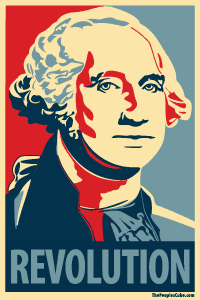By Fred Hutchison | April 19, 2012 | RenewAmerica
 Originally published June 17, 2004
Originally published June 17, 2004
In this essay, I discuss some psychological similarities between Postmodernism and barbarism. Both seem to inflict some of the same kinds of torments upon the mind. I shall contrast these miseries with the joys of a high culture.
Modernism and primitivism
By an irony of history, men of the French Enlightenment began the cult of “progress” at the same time they began to idealize the “noble savage.” This curious paradox occurred in the middle of the eighteenth century. Interestingly, the writings of Jean Jacques Rousseau provided a stimulus for both seemingly contradictory things.
The fascination with primitivism has continued through the modern and postmodern eras. Modernism was disconnected from the great ideals of the classical civilization of Europe — which I like to call Baroque Civilization. In spite of this detachment from the old ideals, Modernism profited greatly from the western cultural heritage. It constantly drew from this heritage in spite of its irrational ideological insistence that the past was “darkened,” the present day is “enlightened,” and the future will be glorious.
There was a Romantic reaction against Modernism in which Classical and Medieval revivals in the arts and architecture occurred. Some critics have pronounced these Victorian styles to be “decadent.” (This kind of decadence is not to be confused with the fin-de-siecle decadent art which was pornographic.) Pitirim Sorokin said that Victorian classicism was “overripe.”
Some sensitive artists and scholars revolted against this overripe decadence and reached towards primitivism. Gauguin, a French post-impressionist painter, traveled to Tahiti to celebrate primitivism in his art and in his experience. Picasso’s transition from Neoclassicism to abstract expressionism began as he obsessively stared at an African mask. Margaret Mead traveled to Samoa seeking a rationale for a liberation from the Victorian “sexual repression” which Freud warned about. She sought an example of sexual liberation in primitive Samoa. Her game of pseudo-science has long since been exposed and discredited. But the myths she created are still in circulation among postmodern liberals. The myths are going strong in the cult of Multiculturalism and in the delusions of the sexual revolution.
In our popular culture, the longing for primitivism and barbarism can still be heard in the primitive beat of much of hard rock music, in cartoonish movies such as 1982’s Conan the Barbarian, and in the clownish exhibitionism of public wrestling.
The fallacies of barbarian fantasies
 Kenneth Clark made short work of the Romantic nostalgia for barbarism. “People tell me that they prefer barbarism to civilization. I doubt if they have given it a long enough trial….they are bored with civilization; but all the evidence suggests that the boredom of barbarism is infinitely greater. Quite apart from discomforts and privations, there was no escape from it. Very restricted company, no books, no light after dark, no hope. On one side the sea battering away, on the other infinite expanses of bog and forest. A most melancholy existence!” (Civilization, by Kenneth Clarke)
Kenneth Clark made short work of the Romantic nostalgia for barbarism. “People tell me that they prefer barbarism to civilization. I doubt if they have given it a long enough trial….they are bored with civilization; but all the evidence suggests that the boredom of barbarism is infinitely greater. Quite apart from discomforts and privations, there was no escape from it. Very restricted company, no books, no light after dark, no hope. On one side the sea battering away, on the other infinite expanses of bog and forest. A most melancholy existence!” (Civilization, by Kenneth Clarke)
Clarke pointed out that the Anglo-Saxon poets had no illusions about barbarism.
“A wise man may grasp how ghastly it shall be/ When all this world’s wealth stands waste/ Even as now, in many places over the earth,/ Walls stand wind beaten,/ heavy with hoar frost; ruined-habitations…/The maker of men has so marred this dwelling/ That human laughter is not heard about it/ and idle stand these old giant works.”
“These fragments have I shorn up against my ruin.” (T.S. Eliot, The Waste Land) Eliot’s gloom sounds a little like barbarian melancholy. He was an intelligent modern looking over the brink at Postmodernism. The existential despair which was shortly to follow Eliot’s time would be even more forlorn in its message. The liberal Postmodernism of our day is one further stage of retreat from hope.
Postmodern counter-culture
Postmodernism is not decadent. It is counter-cultural. Decadence (from the root word decay) is a debasement of aging cultural forms. A counter-cultural revolt is a rejection, not an inferior imitation of the forms’ cultural heritage. Postmodernism involves an utter renunciation of the Western cultural heritage. As a result, Postmoderns not only cherish cultural primitivism, as did their decadent Modernist forbears; they suffer from some of the pathologies which the barbarians used to suffer — boredom, fragmentation, hopelessness, and melancholy.
I would also add claustrophobia. Postmoderns do not suffer the claustrophobia of living at close quarters in a mud hut. I think they suffer from a mental claustrophobia of thinking within the closed system of cultural determinism. It is as though their minds are trapped in an endlessly repeating loop of a computer program. As their thinking has become compressed, they have become prone to narrow ideologies, ideological myths, the terrors of ideological bogeymen, and cartoonish interpretations of the world. The Postmodern renunciation of reason has turned their minds into a shadowy underground cavern in which all the exits are blocked. Such may be the fate of those who turn away from reason and from high culture.
Barbarism is filled with myths and taboos. The politically-correct speech codes of Postmodernism are also full of taboos. A barbarian will kill you if you violate a taboo. A Postmodernist will demonize you if you violate a taboo, will try to block you from speaking, and will prevent you from getting tenure if he can.
Read the full article here.
Related Articles
- Modernism vs. Postmodernism (africanamericanlitcsu.wordpress.com)
- After Postmodernism? “True, but still…” (theotherjournal.com)
- Postmodernity and Professional Life (edprof.net)
- New Romanticism (abigaillaurel.com)
- What makes a postmodern library? (zaddymanlib.wordpress.com)
- Postmodernism: Style & Subversion at the V&A (rattlingoastick.wordpress.com)
- The Enlightenment Was the Catastrophe: (brothersjuddblog.com)







